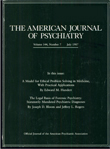HIV and Depression
TO THE EDITOR: I appreciated reading the article by Judith G. Rabkin, Ph.D., M.P.H., and colleagues (1). Their finding, that HIV-infected men were not more depressed as their illness progressed, is consistent with research on the relationship between negative life events and depression. As Kendler and colleagues have shown (2), the relationship is complex and modulated by genetic predisposition. To that equation, Klerman would add such variables as early life experiences, personality traits, coping styles, and social supports (3). Rabkin et al.'s cohort was predominantly white, well educated, generally middle class, and part of a supportive community. Thus, these subjects were probably less likely to be predisposed to depression.
As Rabkin and Struening have previously shown (4), the association between negative life events and various illnesses is generally weak. Perhaps we are getting beyond the stage of looking for simple cause and effect relationships between life stress and mood. We might instead look at HIV cohorts at greatest risk for depression: the poor, substance abusers, and women. In our experience, baseline rates of depression in these groups are quite high, and we are investigating how HIV progression affects these premorbid factors.
Treating depression in HIV groups at risk is important. Depression is a critical variable when one considers compliance with treatment and immune system functioning (5). These issues are particularly important given recent data on the need for strict compliance when using protease inhibitors (in which viral resistance can result from intermittent dosing). Thus, the importance of treating depression in this population may go beyond issues of quality of life. It may be critical to the prevention and management of HIV progression.
1. Rabkin JG, Goetz RR, Remien RH, Williams JBW, Todak G, Gorman JM: Stability of mood despite HIV illness progression in a group of homosexual men. Am J Psychiatry 1997; 154:231–238Link, Google Scholar
2. Kendler KS, Kessler RC, Walters EE, MacLean C, Meale MC, Heath AC, Eaves LJ: Stressful life events, genetic liability, and onset of an episode of major depression in women. Am J Psychiatry 1995; 152:833–842Link, Google Scholar
3. Klerman GL: Discussion, part II, in Stress and Mental Disorders. Edited by Barrett JE, Rose RM, Klerman GL. New York, Raven Press, 1979, pp 111–120Google Scholar
4. Rabkin JG, Struening EL: Life events, stress, and illness. Science 1976; 194:1013–1020Google Scholar
5. Wolpe PR, Gorton G, Serota R, Sanford B: Predicting compliance of dual diagnosis inpatients with aftercare treatment. Hosp Community Psychiatry 1993; 44:45–49Abstract, Google Scholar



